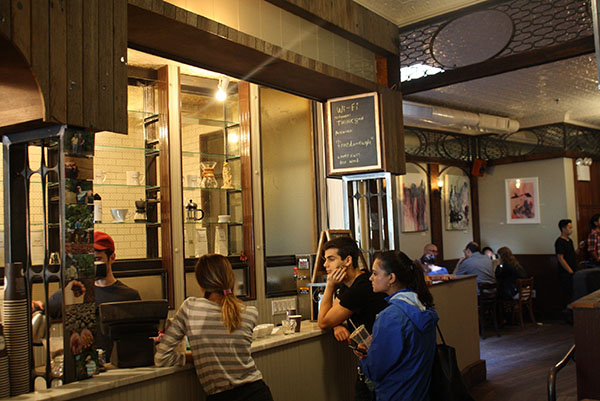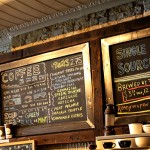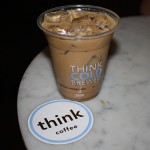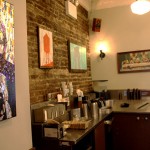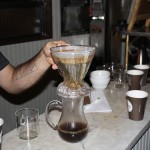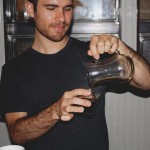Business
Think Coffee Thinks Ahead
NEW YORK – “We hitchhiked across Honduras in freight trucks overnight,” said Noah Welch, 25, Director of Coffee and International Projects at Think Coffee. This was the first of many trips that Welch would take internationally to inspect the quality of coffee used in Think Coffee stores, seven in New York City and five in South Korea.
Like other top-notch chains, Think Coffee thinks hard about where their beans come from. The company began with all Fairtrade, Organic Certified (FTO) coffee blends, testing to make sure no chemicals were used. It was only after making personal visits to farms around the world that Scherr and his Farmer Relations Team realized that organic wasn’t enough.
“We got it into our heads that we needed to find out where the coffee actually came from,” said Welch. “So we started traveling and learned that FTO certifications weren’t necessarily the best thing.”
Welch and his team took the first step towards independent sourcing. They began traveling to places like Nicaragua, Ethiopia, Mexico and Indonesia to find coffee farmers who offered the different components of their existing blends.
“We’ve found most of our farmers just by traveling, by getting on a plane, then a bus to a town,” said Welch. “Sometimes, we’ve tasted their coffee somewhere in New York. Sometimes, somebody tells us about them.”
Think Coffee provides what they call a Farmer’s Dividend to each international farmer they buy from. “We actually provide a dollar per pound directly back to the farmer,” said Scherr in an interview on the company website.
Outside of buying from farmers in different countries, the company wants to help improve the quality of life in the areas they are buying from. With the close relationships they’ve created, Welch considers these farmers his “extended family.” They have ongoing projects in Kellensoo, Ethiopia, and Nicaragua.
“It started [with] a library and turned into shipping reusable menstrual pads made by Days for Girls International, a non-profit organization,” said Welch. “The next step is to build a sewing room.”
Not all customers are aware of the work that Think Coffee does internationally. Customers like Carly Peterson, 16, a Minnesota native, stumbled upon Think Coffee during her time in a pre-college program in the city. She quickly became a regular. Once Peterson learned of Think Coffee’s international projects, her eyes widened. “That’s amazing,” she said, “Great coffee for a great cause.”
Cassidy King, a regular at the Think Coffee on Mercer Street, did not know of the company’s international work, but said, “Now I feel less guilty about coming here since they’re helping the world.”
Although it doesn’t happen often, Welch is appreciative of the customers that come in and ask questions about their coffee processes.
“We want to be as transparent about our relationships with farmers as we can,” said Welch, “It’s rare that people ask, but when they do, the questions that people have are, ‘Is this fair trade? Is this organic?'”
Despite the skepticism, Welch wants people to experience Think Coffee the way he did when he was a student at New York University. He used to go to coffee tastings at Think Coffee’s location on Mercer Street and credits it as a part of the reason why he ended up in his current position.
Now, Jesse Hardy, 29, Public Coordinator for Think Coffee, holds coffee tastings at their location on Eighth Avenue every Friday at 2:00 p.m. for an hour. They explain to customers the process of obtaining their coffee in different countries. Each tasting is focused on blends from specific countries.
“On a slow day, less than two to three people attend the tasting. But on busier days, there are so many people that it can be hard to manage,” said Hardy.
- Free public coffee tastings held every Friday at 2:00 p.m. on 73 Eighth Avenue.
- Think Coffee’s menu at the Eighth Avenue location.
- Small Iced Mocha ($4.50) and Think Coffee sticker available at all locations.
- Coffee Bar in Think Coffee on Eighth Avenue.
- Filtering ground coffee during a public tasting.
- Jesse Hardy, 29, Public Coordinator pouring coffee during a public tasting.
Making changes in sourcing has captured the attention of other companies as well such as Joe Coffee and even Starbucks, according to Welch, but Think Coffee, in 2009, was the first.
In 2010, Starbucks created a reserve line of coffees. For a limited time each year, Starbucks brings coffee from all around the world to their shops. This year, the featured coffees include beans from Da Lat, Vietnam; Santa Ines, Brazil; and Kimuli, Tanzania. According to the reserve website, Starbucks works with communities to improve the quality of life for farming families.
July 2013 marked the launch of Joe Coffee’s own roasting operations in Brooklyn. The company roasts 100 percent of their own single-origin and blended coffees. Joe’s buying philosophy includes “every green coffee transaction being traceable.” Through a traceable supply chain, they ensure that farmers are paid above Fairtrade minimums.
“I think it’s great that the industry is moving in that direction, and I would like to think that we have influenced that for the better,” said Welch. “Think Coffee isn’t big on marketing so it is odd to see a multi-million dollar franchise replicate an on-the-rise company like themselves.”
As for the smaller coffee shops in the area, Welch says that he thinks the whole industry has been pushing in this direction for a while now. And, while they may be pushing in that direction, Welch also notes that nobody has yet to reach the level of intensity that Think Coffee has.
“I know a lot of places that are good at talking about doing stuff like this, but I don’t think that they could call up somebody in the middle of Bellavista, Mexico and say, ‘Hey, I’m coming tomorrow. Will you have a bed for me?'” Think Coffee continues to search for coffee on international farms that would produce mutually beneficial relationships.
[google-map-v3 shortcodeid=”TO_BE_GENERATED” width=”350″ height=”350″ zoom=”18″ maptype=”roadmap” mapalign=”center” directionhint=”false” language=”default” poweredby=”false” maptypecontrol=”true” pancontrol=”true” zoomcontrol=”true” scalecontrol=”true” streetviewcontrol=”true” scrollwheelcontrol=”false” draggable=”true” tiltfourtyfive=”false” enablegeolocationmarker=”false” enablemarkerclustering=”false” addmarkermashup=”false” addmarkermashupbubble=”false” addmarkerlist=”123 4th Ave, New York, NY 10003{}coffee.png|248 Mercer St, New York, NY 10012{}coffee.png|73 8th Ave, New York, NY 10014{}coffee.png|1 Bleecker St New York, NY 10003{}coffee.png|568 6th Ave New York, NY 10011{}coffee.png|208 W 13th St New York, NY 10011{}coffee.png|620 W 42nd St New York, NY 10036{}coffee.png” bubbleautopan=”true” distanceunits=”miles” showbike=”false” showtraffic=”false” showpanoramio=”false”]


